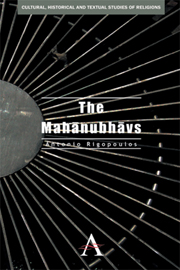Book contents
- Frontmatter
- Contents
- Dedication
- 1 Introduction
- 2 The Early Historical Background and the Mahānubhāvs' Foundational Texts
- 3 The Five Manifestations of the Supreme God Parameśvar
- 4 Elements of Mahānubhāv Doctrine
- 5 Mahānubhāvs' Practice: Devotion and Asceticism
- 6 Mahānubhāvs and Other Religions
- Bibliography
2 - The Early Historical Background and the Mahānubhāvs' Foundational Texts
Published online by Cambridge University Press: 05 May 2012
- Frontmatter
- Contents
- Dedication
- 1 Introduction
- 2 The Early Historical Background and the Mahānubhāvs' Foundational Texts
- 3 The Five Manifestations of the Supreme God Parameśvar
- 4 Elements of Mahānubhāv Doctrine
- 5 Mahānubhāvs' Practice: Devotion and Asceticism
- 6 Mahānubhāvs and Other Religions
- Bibliography
Summary
In Cakradhar's times, the kingdom in power was that of the Yādavs. Their capital was Devgirī (= Daulatābād, near Auraṅgābād) in the Marāṭhvāḍā region. The kingdom's heartland was the agricultural area of the Godāvarī basin in northern Mahārāṣṭra, which came to be extended: from here, the Yādavs tried to expand their rule to much of the rest of the actual State of Mahārāṣṭra as well as to other parts of the Deccan. Although the Yādav kingdom was small, it considered itself as a great force from the Arabian sea to the central regions of the subcontinent. The Yādav army fought against Gujarāt and MāỊvā to the north and against the HoysaỊa empire to the south. Under the leadership of King Siṅghaṇa early in the thirteenth century, the Yādavs invaded Gujarāt and other regions, establishing a dominion which, however, lasted only a few years.
Presenting themselves as orthodox brāhmaṇs intent upon the restoration of the sacred Vedas, the Yādav rulers claimed to govern society strictly following the precepts of the caste system and of the brāhmaṇical stages of life (varṇāśrama-dharma, catur-varṇya). Most importantly, the Yādav kings spoke Marāṭhī and patronized the Marāṭhī language in a variety of ways. The kingdom played a crucial role in the rise of the self-awareness of an entire region as a cultural whole. Significantly, Jñāndev mentions King Rāmcandra as «the delight of the Yādav race» (Jñāneśvarī 18.1783) and refers to the kingdom's capital Devgirī as «the city of the Marāṭhī language» upon which he prays that «the blessed day of the knowledge of the Absolute» may dawn (Jñāneśvarī 12.16).
- Type
- Chapter
- Information
- The Mahanubhavs , pp. 21 - 32Publisher: Anthem PressPrint publication year: 2011



